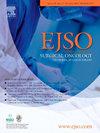首要嫌疑人还是集体责任?特定淋巴结站清扫对新辅助化疗后局部晚期胃癌患者短期和长期预后的影响。
IF 3.5
2区 医学
Q2 ONCOLOGY
引用次数: 0
摘要
背景:淋巴途径是胃癌(GC)扩散的主要途径,淋巴结(LN)受累是根治性切除后的主要预后因素。本研究的目的是评估特定LN站解剖的结果。方法:纳入2013年至2023年间接受多模式治疗的局部晚期(cT2-4N0-3M0) GC患者。未行胃切除术、早期胃癌(cT1)或转移性胃癌、接受过多器官切除术、姑息治疗、在以治愈为目的的计划治疗结束前死亡或临床或病理信息不完整的患者被排除在外。主要终点是严重并发症的发生,次要终点是生存期。结果:多变量分析显示,在接受新辅助化疗(NAC)的患者中,观察到10站淋巴结切除术与术后严重并发症的高风险相关。(27.6% vs 8.7%;OR = 3.28)在非nac组中,观察到13站淋巴结切除术与术后严重并发症的风险较高。(57.1% vs 13.2%;or = 6.96)。在NAC组中,8站(HR = 0.53)或11站(HR = 0.53)淋巴结切除术患者的死亡风险较低。结论:虽然D2淋巴结切除术仍然至关重要,特别是在大容量,经验丰富的GC中心,但我们的研究结果不支持更广泛的D2+淋巴结切除术的必要性。此外,我们的目的是强调量身定制的手术入路的重要性,并强调LN站清扫对短期并发症和长期生存结果的影响。本文章由计算机程序翻译,如有差异,请以英文原文为准。
Prime suspect or collective responsibility: Impact of specific lymph node station dissection on short- and long-term outcomes among locally advanced gastric cancer patients after neoadjuvant chemotherapy
Background
Lymphatic route is the main pathway for gastric cancer (GC) spread, and lymph node (LN) involvement is a major prognostic factor after curative resection. The aim of this study was to assess the outcomes of specific LN station dissection.
Methods
Patients with locally advanced (cT2-4N0-3M0) GC who underwent multimodal treatment between 2013 and 2023 were included in the study. Patients who had not undergone gastrectomy, had early (cT1) or metastatic GC, who had undergone multiorgan resections, palliative care, had died before the end of curative-intent planned treatment, or had incomplete clinical or pathological information were excluded. The primary endpoint was the development of serious complications, and the secondary outcome was OS.
Results
Mulivariable analysis revealed, that among patients who received neoadjuvant chemotherapy (NAC), it was observed that station 10 lymphadenectomy was associated with a higher risk of serious postoperative complications. (27.6 % vs 8.7 %; OR = 3.28) Among the no-NAC group, it was observed that station 13 lymphadenectomy was associated with a higher risk of serious postoperative complications. (57.1 % vs 13.2 %; OR = 6.96). Among the NAC group, a lower risk of death was observed in patients with station 8 (HR = 0.53) or 11 lymphadenectomy (HR = 0.53).
Conclusion
While D2 lymphadenectomy remains crucial, particularly in in high-volume, experienced GC centers, the necessity of a more extensive D2+ lymphadenectomy is not supported by our findings. Moreover, we aimed to highlight the importance of tailored surgical approaches and emphasize the significance of LN station dissection in influencing both short-term complications and long-term survival outcomes.
求助全文
通过发布文献求助,成功后即可免费获取论文全文。
去求助
来源期刊

Ejso
医学-外科
CiteScore
6.40
自引率
2.60%
发文量
1148
审稿时长
41 days
期刊介绍:
JSO - European Journal of Surgical Oncology ("the Journal of Cancer Surgery") is the Official Journal of the European Society of Surgical Oncology and BASO ~ the Association for Cancer Surgery.
The EJSO aims to advance surgical oncology research and practice through the publication of original research articles, review articles, editorials, debates and correspondence.
 求助内容:
求助内容: 应助结果提醒方式:
应助结果提醒方式:


